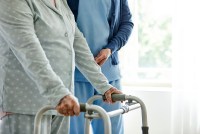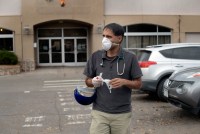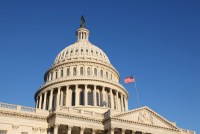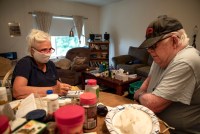Latest Morning Briefing Stories
It’s Not Just Covid: Recall Candidates Represent Markedly Different Choices on Health Care
Those seeking to replace California Gov. Gavin Newsom in Tuesday’s recall election disagree with him on more than mask and vaccine mandates. The conservative candidates tend to favor free-market solutions over Newsom’s expansion of publicly funded health coverage.
Colorado Clinic’s Prescription for Healthier Patients? Lawyers
Medical-legal partnerships in Montana, Colorado and elsewhere across the nation operate on the notion that fixing patients’ legal ills is a vital part of their health care.
California Set to Spend Billions on Curing Homelessness and Caring for ‘Whole Body’ Politic
California is embarking on a five-year experiment to infuse its health insurance program for low-income people with billions of dollars in nonmedical services spanning housing, food delivery and addiction care. Gov. Gavin Newsom said the goal is to improve care for the program’s sickest and costliest members and save money, but will it work?
Beneficiarios de Medicaid se vacunan mucho menos contra covid
Si bien más de 202 millones de estadounidenses están vacunados al menos en parte contra covid, casi el 30% de las personas mayores de 12 años siguen sin vacunarse. Las encuestas muestran que los más pobres tienen menos probabilidades de recibir una vacuna.
Medicaid Vaccination Rates Founder as States Struggle to Immunize Their Poorest Residents
Efforts by states and the private health plans that many states pay to cover low-income Americans has been scattershot and hampered by a lack of data.
Headed Away to School? Here’s What Students With Health Issues Need to Know
College and grad students with chronic health conditions as common as asthma and diabetes may need to clear hurdles to make sure their health needs are covered by insurance if they go to school far from home.
Biden’s No-Jab-No-Job Order Creates Quandary for Nursing Homes
Nursing home operators acknowledge that large numbers of staff members are not getting the shots but fear a federal vaccination mandate could drive away workers in a tight labor market.
KHN’s ‘What the Health?’: Booster Time
As the delta variant continues to spread around the U.S., the Biden administration is taking steps to authorize covid vaccine boosters, require nursing home workers to be vaccinated and protect school officials who want to require masks despite state laws banning those mandates. Meanwhile, the U.S. House is returning from its summer break early to start work on its giant budget bill, which includes a long list of health policy changes. Alice Miranda Ollstein of Politico, Margot Sanger-Katz of The New York Times and Kimberly Leonard of Business Insider join KHN’s Julie Rovner to discuss these issues and more.
KHN’s ‘What the Health?’: The Senate Acts
The U.S. Senate worked well into its scheduled August recess to pass a bipartisan infrastructure bill and a budget blueprint that outlines a much larger bill — covering key health priorities — to be written this fall. Meanwhile, the latest surge of covid is making both employers and schools rethink their opening plans. Joanne Kenen of Politico, Mary Ellen McIntire of CQ Roll Call and Yasmeen Abutaleb of The Washington Post join KHN’s Julie Rovner to discuss these issues and more. Also, for “extra credit,” the panelists suggest their favorite health policy stories of the week they think you should read, too.
Feds to Nix Work Requirements in Montana Medicaid Expansion Program
State health officials say the federal government will likely reject any work or community engagement requirements, which were key to Republican lawmakers agreeing to extend the program that insures 100,000 low-income Montana adults.
KHN’s ‘What the Health?’: Hot Covid Summer
The summer that promised to let Americans resume a relatively normal life is turning into another summer of anxiety and face masks, as the delta variant drives covid caseloads up in all 50 states. Meanwhile, the Americans with Disabilities Act turns 35, and the Missouri Supreme Court orders the state to expand Medicaid after all. Mary Ellen McIntire of CQ Roll Call, Anna Edney of Bloomberg News and Rachana Pradhan of KHN join KHN’s Julie Rovner to discuss these issues and more. Also, Rovner interviews KHN’s Samantha Young, who reported and wrote the latest KHN-NPR “Bill of the Month” episode about an Olympic-level athlete with an Olympic-size medical bill.
How a Doctor Breaks Norms to Treat Refugees and Recent Immigrants
In a suburb of Denver, a doctor runs a clinic that finds creative solutions to treat a large refugee and immigrant population, sometimes to the dismay of the medical establishment.
El acuerdo sobre el presupuesto estatal para 2021-22 incluye varias disposiciones que facilitarán el acceso y la permanencia en Medi-Cal. Todas las personas mayores de 50 años serán elegibles, independientemente de su estatus migratorio.
California Makes It Easier for Low-Income Residents to Get and Keep Free Health Coverage
State lawmakers aim to expand Medicaid enrollment by dedicating billions of dollars in coming years to simplifying paperwork, extending pregnancy coverage and opening the program to thousands of new enrollees, including older unauthorized immigrants and people who need nursing home care.
Senate Democrats’ Plan Boosts Spending on Medicare, ACA Subsidies, Long-Term Care
The plan from high-wire negotiations would affect five key areas of health, but there will be further tense negotiations among Democratic lawmakers about specifics of the $3.5 trillion in funding. And all Senate Democrats will need to be behind the plan, because Republicans oppose it.
KHN’s ‘What the Health?’: Becerra Urges Congress to Expand Medicare, Address Rx Prices
Health and Human Services Secretary Xavier Becerra is the special guest for this bonus episode of KHN’s “What the Health?” podcast. He and host Julie Rovner discuss a breadth of topics the secretary oversees, including covid-19, prescription drug prices, Medicare, Medicaid and the Affordable Care Act.
A Family Wellness Check: California Invests in Treating Parents and Children Together
The state will be the first to offer comprehensive counseling services to parents during pediatric visits as part of Medicaid.
Hospital Prices Must Now Be Transparent. For Many Consumers, They’re Still Anyone’s Guess.
A Trump administration rule mandating that hospitals disclose true prices on their websites took effect this year. But compliance is spotty and even when the data is public, it’s hard to find and understand.
KHN’s ‘What the Health?’: Un-Trumping the ACA
The Biden administration is moving to undo many of the changes the Trump administration made to the enrollment process for the Affordable Care Act to encourage more people to sign up for health insurance. Meanwhile, Congress is opening investigations into the controversial approval by the Food and Drug Administration of an expensive drug that might (or might not) slow the progression of Alzheimer’s disease. Joanne Kenen of Politico, Kimberly Leonard of Insider and Sarah Karlin-Smith of the Pink Sheet join KHN’s Julie Rovner to discuss these issues and more. Also, Rovner interviews Marshall Allen of ProPublica about his new book, “Never Pay the First Bill: And Other Ways to Fight the Health Care System and Win.”
Desperate for Home Care, Seniors Often Wait Months With Workers in Short Supply
The covid pandemic and President Joe Biden’s agenda — a planned $400 billion infusion of support — have focused national attention on the need to expand home- and community-based long-term care services designed to keep people out of nursing homes. But the need far outpaces the staffing.




















